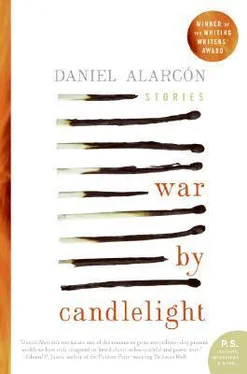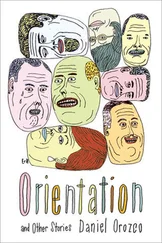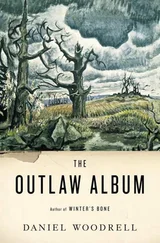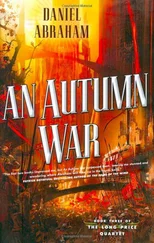I did a last run through the house. We were almost done. It was my first time out, my old man’s way of saying he trusted me. I wanted in because I trusted him. We were going to be okay. I knew it. We would have money. We would finish the second story of our house, and my mother would be happy again. They would both be happy. I had no idea that he was preparing to leave us.
I lingered at the top of the stairs, looking at the room we’d built. It was really something, even with the gaping hole where the television had been. I was proud of my work. A few steps down the hall, along the tiles I’d laid myself, was Andrés’s room. I wasn’t looking for anything in particular. We’d already taken his boom box and alarm clock. I turned on the lamp. In the closet there were half a dozen pairs of shoes and button-down shirts in white and blue. I touched them all. I ran my fingers along the rack and found it: his gray wool suit. I’d just pulled it from the closet when my father walked in.
“What the fuck are you doing?” he hissed. “Turn that goddamn light off!”
“I’m sorry,” I said. We were in darkness again.
“We’re leaving. Put that back,” he said. “We can’t sell that.”
“We could.”
“We’re in a hurry, Chino. Let’s go.”
“It’s for me,” I said.
“This isn’t a department store. You don’t need that.”
He was right. I didn’t need it, wouldn’t need it. Not until I wore it for my interview at El Clarín seven years later. I knew it would take me a year or two to grow into it, if I grew into it at all. It was a dull, shapeless longing, but it was real. “I want this,” I said, “for my birthday.”
I could barely see him in the purple shadows.
“Your birthday?” my father said. He’d forgotten. “Well then, take it.”
I rode around the city in my green-and-white suit and thought about my mother. I put my article in an envelope, sealed it, and dropped it in the mail. I didn’t see Villacorta, or check the paper to see if he’d published it. I broke away from Tonio and Jhon, paid them twenty soles for the suit and the shoes and the memories. I thanked them from the very bottom of my new clown heart. And I didn’t do their act, or any act. I spent my savings. I put on the polka-dotted suit and stepped into the unwieldy shoes. I painted my face in the dim reflection of the hallway mirror. I placed the red Ping-Pong ball over my nose, felt the tight pull of the rubber band against my hair. And I rode the buses, paying my fare like any other passenger, except that I was unlike any other passenger. I knew I would see her. This was our city, hers and mine. We would meet somewhere beneath Lima’s mournful gaze.
I rode to La Victoria, where the corner kids eyed me, wondering if it was worth their trouble to mug a clown. I walked the narrow streets, my shoes flopping on the crumbling sidewalks. I sat on a bench in front of Carmela’s house and waited. My black brothers came and went to their schools, to their jobs. They didn’t even shoot me a glance. I was part of the architecture. A cop stopped and asked if I was all right.
“Just resting, chief,” I said.
Was I from around here?
“I’m Don Hugo’s kid.”
“Carmela’s Hugo?” he asked. Then he left me alone.
Carmela came home carrying dresses, and smiled at me because she smiled at everyone. Her door swung open wide, and from my bench I peered into her world, my mother’s new world. And then things came at me in waves: the street, the house. I haven’t seen you since you were this big , Carmela had said at the hospital. I remembered. When I was six, Don Hugo had taken me to see his mistress. I’d never seen a black person before. I cried and said she looked burnt. She grinned and pinched my cheek. He hit me and told me to be nice to my tía . Now I couldn’t bring myself to ring the doorbell. I knew she would have been kind, even with me dressed this way. As kind as she was to my mother. She’d answer any of my questions and tell me how she met my father, how she fell for him, the sweet things he’d told her. Carmela and my mother must have spoken of all this already. What revelations did I have for them anyway? They had worked out the details of their parallel heartbreaks: who had him when, who had him first, who was innocent, who was guilty. And they’d forgiven him, and that was the most astounding thing of all.
Why were you always forgiving him, Ma? He told her everything first — about you, about me, about the work he did and planned to do. He let you swim in darkness, and wonder at the vacant spaces, and ask yourself what mistakes you’d made. And then he left us. And you forgave him, Ma. You forgave him.
After we broke into Andrés’s house, the loot was split, but my mother and I saw none of it, except the gray wool suit. The next week I found myself burnishing the lacquered floorboards of another fine home. Another Saturday, and then another. I went on three jobs with my father and his crew. I understand now that money must have been tight. He had four sons to support. We’d just finished a two-week job on a house when Felipe came by with the van. I remember thinking it was strange that they hadn’t given the place time to cool. I thought I understood the hustle. I asked my father about it.
“Shut up,” he said. “Don’t ask questions.”
We drove through the dark streets. I sat in the back, felt the van swaying. I had no idea where we were going, but when I got out, I knew immediately where I was. I looked at my father, horrified, expecting some kind of explanation, but he just shrugged. Crazy things happen in the city. They boosted me over the wall, into that garden where I’d played as a child. I could see through the glass window, the high bookshelves against the far wall, the elegant leather sofas.
They were too rich and too trusting. Their watchman was asleep in a rickety wooden chair. I opened the garage door from the inside and the man woke with a start. My father stepped in and broke his jaw. Felipe dragged him into the garden and tied him to a tree. The watchman sat there, blindfolded and gagged and bleeding, while we disassembled the house. Their possessions were so familiar it was like stealing from myself.
It was terrifying and logical: the riskiest hit of all. I led Felipe and my father around the house like a tour guide: don’t forget the microwave and the blender my mother loves so much. And, in here, the clock and the old engineer’s nifty calculator and the television with its remote control. There was something beautiful in our silent artistry. Everyone would be a suspect. The gardener, my mother, my father, me. Whichever members of the crew had worked on the house. And the watchman tied to the tree, bleeding into a rag.
The van was full. It was time to go. The watchman’s chin was slumped into his chest, his breathing heavy. I felt the conviction that he too was one of us, and it disgusted me. It could have been anything: a stray light that shone on him or a spasm in his face that made me think he was smiling. I kicked him. He snapped to attention, seeing only his blindfold. He struggled against the tree. I hocked something viscous and unclean on his forehead. The color of money.
My father called me, and we disappeared.
She left Carmela’s and I followed her. She got on the bus at Manco Capac. She wore her uniform, as clean and as white as a high summer cloud. She didn’t notice me behind her, sat across from me innocently, not even looking in my direction. I closed my eyes, felt the rumble of the bus along the potholed avenue. The ticket collector sang the route: La Victoria, San Borja! La Victoria, San Borja! Between the standing passengers, I could still catch glimpses of her. No one sat in the empty seat beside me. Then she stood. She got off, and I followed.
Читать дальше












